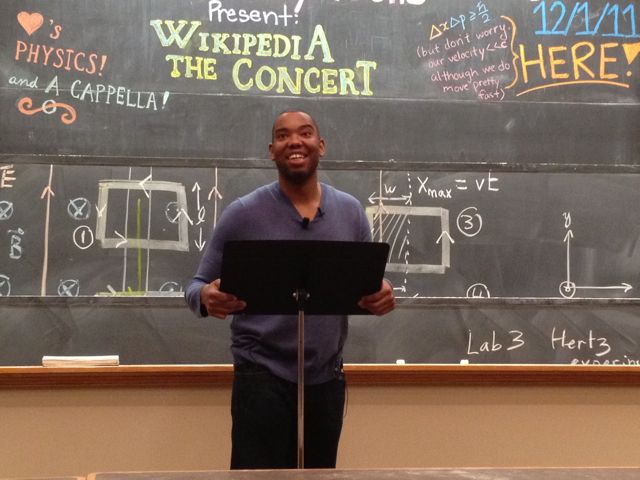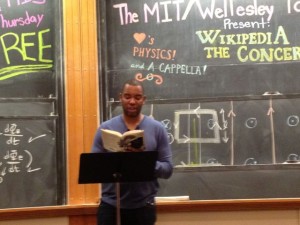So yesterday was just another day at MIT…took in a lunch lecture by the Director of the Defense Advanced Research Projects Agency (DARPA), talking about how to avoid spending our entire GDP on one airplane by 2050 and avoid losing American manufacturing expertise, then harassed our students to do some more blogging, then SAW TA-NEHISI COATES LIVE IN PERSON. OK maybe not so typical…
I have been reading “TNC” since he started blogging for the Atlantic Monthly in 2008, and his real-time chronicling of his intellectual (and emotional) journey into Civil War history, 19th Century classic novels, and many other avenues has pulled me along with him in ways that have been very rewarding, and not at all like the relationship you might have to, say, Philip Roth.
There is a lot to say about Ta-Nehisi’s talk, but to get this out in front of “The Horde” (TNC’s passionate commenter/reader community) and get it down for myself I will try to summarize. He went through his early history (as recounted in The Beautiful Struggle) of finding in Dungeons and Dragons and hip-hop a way into conjuring up a sense in language of a place, a time, even if you might not understand in a literal way exactly what Queensbridge or paladins are all about. Then as he got into college and was exposed to poets like Yusuf Komunyakaa he continued to focus in on how language can evoke, conjure up a sense of being somewhere–and that is the approach he brought to bear in Beautiful Struggle when writing about growing up in Baltimore. As he put it after reading from the memoir, his editors might have wanted him to do the whole Norton Anthology footnoting approach to help unpack his vernacular/mash-up language, but he wanted his readers to appreciate that (now quaintly pre-Wikipedia) sense of not knowing every detail but getting the sense of Baltimore and his young life.
TNC went through how after Beautiful Struggle he found himself needing to fill in his blind spot around the Civil War and Reconstruction eras, and found himself moved again by books like Capital Men (on the Reconstruction-era Black Congressmen), Battle Cry of Freedom (James McPherson’s masterful one-volume Civil War history), and Frederick Douglass’ three autobiographies. Ta-Nehisi read from Douglass and from other primary sources from the period, and talked about what a distinctly different sense of language you get from hearing these long sentences, and the words of a freed slave claiming the land “he is locates upon,” which is more than just imperfect grammar but actually conveys the centuries leading up to that moment of claiming land and rights.Ta-Nehisi said that in reading this language from slaves and freed slaves–AND the language of white slave-holding women, also located in a bound/limited society but in a different position–he has tried to evolve as a writer to be able to evoke a language that is true to characters in all these different positions within society. This process (aided by further readings in George Eliot, Jane Austen, et. al.) has pushed him as a writer to transcend his own personal antipathy to the values or morals of these characters in order to find a voice for them that makes sense and conjures up their lives in that time.
What all this has led up to is TNC’s current project, which is a novel set in the Civil War era, based in four first-person narratives — two men, two women; two white, two black — that will in due time cohere around a slave woman’s escape and the attempts to recapture her. Ta-Nehisi read a passage in which the black male and black female characters recount their experience of meeting at an open-air dance. I found his language powerfully evocative of dancing as both liberating and unconstrained–he has the woman say “I would dance before I would eat”–while also being contingent, always marked by the relationships that might be started but then sundered by death or distance. I will certainly look forward to reading the finished version and felt privileged to hear this trial run, which as TNC mentioned in his post-script must have been moving for him too, to represent these voices in public for the first time.
Besides all this recap, my little bit of Coates Studies analysis here that came out in the Q&A is that he developed this arsenal of myth-making or myth-referencing language through writing his memoir, through being steeped in D&D and Nas(rul), as his main mode of evoking the truth of his lived experience. But in his next non-fiction project (BREAKING NEWS), a book he plans to write on the Civil War as lived in the fantasies of North and South ever since, he plans to take on the incredible persistence of myth as the lens through which people see the war and its rationale/justifications/meaning. For years in his blog he has been doing this, for example citing the language of the Articles of Secession that specifically says “we’re doing this do defend slavery” and showing how little effect that historical reality has on those who have a stake in believing the war was about anything but. It should be really interesting to see how he builds on his own experience of language as “conjuring” to get at what the Southern post-Civil War language/acts of conjuring have meant for the country.
[UPDATES: TNC is the Martin Luther King, Jr. Visiting Scholar at MIT in 2012-2013! I added this link because this post embarrassingly is top result for a “coates MIT” search]


